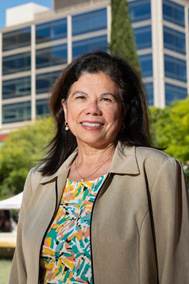Tad and Dianne Taube Establish Endowed Professorship in Global Health; Yvonne Maldonado, MD, is appointed first holder

Yvonne “Bonnie” Maldonado, MD, has been appointed the first holder of the Taube Professorship in Global Health and Infectious Diseases. (Photography Credit: Steve Fisch, Stanford Medicine)
Tad and Dianne Taube have made a generous $2 million gift to establish the Taube Professorship in Global Health and Infectious Diseases at Stanford University School of Medicine. It was matched with an additional $2 million from Andi Okamura and Jeff Chambers, chair of the Board of Directors for Lucile Packard Children’s Hospital Stanford. The first holder of this prestigious endowed professorship is pediatrician Yvonne “Bonnie” Maldonado, MD, one of the world’s top experts in infectious diseases.
“The current pandemic underscores the importance of strong leadership and world-class scientific research, as well as the critical need to invest in this work to be prepared for future pandemics,” says Tad Taube, chairman of Taube Philanthropies. “We are proud to establish this professorship to advance care for children everywhere and to advance science. Dianne and I are thrilled that Dr. Maldonado, a world-class researcher, will be the initial holder of the Taube Endowed Professorship."
When the COVID-19 pandemic hit, Maldonado became a key player at the forefront of Stanford Medicine’s clinical response and research efforts. Maldonado is involved in two epidemiological studies of COVID-19, as well as vaccine and treatment trials. She is working closely with leaders at county, state, and national levels to guide decisions on safely reopening the economy, understanding and reducing transmission, and ensuring the equitable distribution of safe and effective vaccines. In addition, she is the university’s key scientific spokesperson on all things COVID-19, communicating with news media from across the country.
Maldonado has also extensively studied viral diseases such as polio, measles, and Ebola around the world. Her work on mother-to-child transmission of HIV in sub-Saharan Africa is credited with preventing hundreds of thousands of babies from acquiring HIV.
“We are deeply grateful for the Taubes’ support, and it is with tremendous pride that we recognize Dr. Maldonado with this professorship,” says Mary Leonard, MD, MSCE, Arline and Pete Harman Professor and chair of pediatrics at Stanford University School of Medicine, and Adalyn Jay Physician-In-Chief at Packard Children’s Hospital. “It ensures that Dr. Maldonado can continue her exceptional work, making a difference in this pandemic and in preventing other global infectious diseases.”
Maldonado is a professor of pediatrics, epidemiology, and population health, and chief of the division of pediatric infectious diseases, at the School of Medicine. She also serves as senior associate dean for faculty development and diversity. Maldonado chairs the American Academy of Pediatrics Committee on Infectious Diseases and is a recent member of the Board of Scientific Counselors for the Office of Infectious Diseases at the Centers for Disease Control and Prevention.
The Taubes’ gift was matched by Chambers and Okamura, who established a 1:1 challenge match to inspire other donors to fund four new pediatric endowed professorships at the School of Medicine. Endowed professorships provide funding in perpetuity and enable physician-scientists to innovate and make a greater impact. They are the highest honor that can be awarded to a faculty member and are crucial in helping the university recruit and retain exceptional leaders.
“I am very honored to be the first holder of the Taube Professorship in Global Health and Infectious Diseases,” says Maldonado. “This support will help my team to further our mission of protecting kids around the world from illnesses—some of which are totally preventable and treatable. Although it’s especially challenging right now with COVID-19, the work we are doing to help others couldn’t be more fulfilling and exciting.”
The Taubes have made other generous gifts now totaling over $48M to support Packard Children’s Hospital and Stanford Medicine’s critical needs, including naming the Tad and Dianne Taube Pavilion at Packard Children’s Hospital and funding research on pediatric cancer, youth addiction, concussions, and pediatric neurodegenerative disease.
